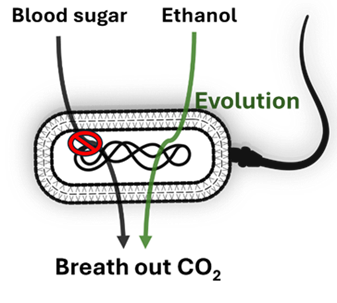Background
When one consumes alcohol, the major pathway for its removal from the body is oxidation in the liver. This process primarily involves the enzyme alcohol dehydrogenase (ADH) in the cytosol, which converts ethanol into acetaldehyde, a toxic intermediate. Acetaldehyde is then further metabolized to acetate by aldehyde dehydrogenase (ALDH) in the mitochondria. The accumulation of acetaldehyde is responsible for many of the unpleasant symptoms associated with hangovers.
Probiotics are supplements that contain microorganisms, typically bacteria, that when ingested can provide strong health benefits. The currently available probiotics designed to remedy hangovers do so by having the bacteria metabolize the toxic acetaldehyde into acetate however they will consume blood sugar (glucose) before alcohol, which poses a metabolic disturbance. This reduces the probiotic’s effectiveness as a hangover remedy and the effect on blood sugar levels can be dangerous for people with diabetes.
Description of the invention
Researchers at the University of Waterloo have developed a two-step strategy to engineer a strain of probiotics that can treat alcohol induced hangovers without interfering with blood sugar levels. The bacteria can efficiently use ethanol as its sole carbon source and converts it into CO2, which is breathed out instead of lingering in the body unlike other detrimental metabolites which cause the effects of a hangover.
Advantages
Implementing this strategy creates a probiotic that is both more efficient at removing ethanol from the body and poses no metabolic disturbance. The bacteria target the source of the problem, ethanol, preventing the body from metabolizing it into harmful substances. It does not affect blood glucose levels, offering a safe alternative to everyone including diabetics. It also converts the ethanol into easily removed CO2, further alleviating hangover symptoms and duration.
Potential applications
- A diabetes-safe probiotic to treat alcohol induced hangovers
- The method of gene engineering may be applied to other probiotics

Reference
10260
Patent status
Patent filed
Stage of development
Prototype developed with ongoing research
Contact
Scott Inwood
Director of Commercialization
Waterloo Commercialization Office
sinwood@uwaterloo.ca
uwaterloo.ca/research